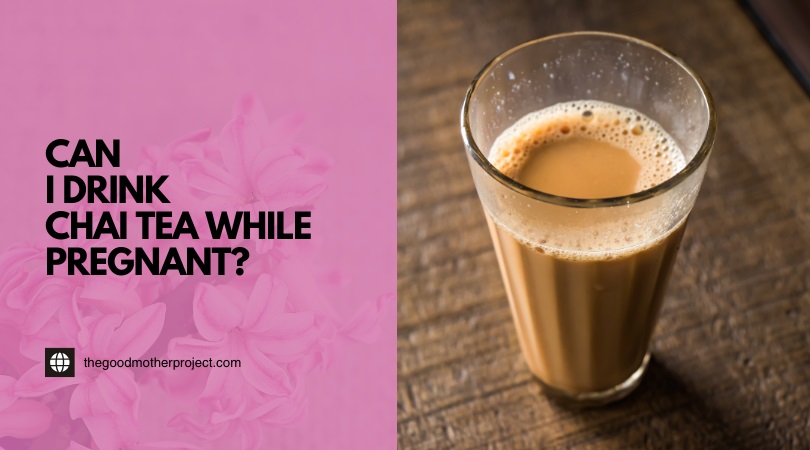Last Updated on January 6, 2025
Yes, you can drink chai tea while pregnant, but moderation is key. Monitor your caffeine intake and consult your doctor for personalized advice.
Chai tea, a popular beverage, blends black tea with spices like ginger, cardamom, and cinnamon. Many pregnant women enjoy its rich flavor and potential health benefits. Chai contains antioxidants and may aid digestion. However, some ingredients can affect pregnancy. Caffeine, found in black tea, can cross the placenta and impact your baby’s development.
It’s essential to balance your chai consumption with overall caffeine limits during pregnancy. Always prioritize your health and your baby’s well-being. Knowing how to enjoy chai tea safely can enhance your pregnancy experience. Stay informed and make choices that benefit both you and your growing baby.
The Allure Of Chai Tea During Pregnancy
Chai tea captivates many with its rich flavors and comforting aroma. Pregnant women often crave warm, soothing drinks. Chai provides a delightful blend of spices and tea. It offers a sense of warmth and comfort during pregnancy.
Expecting mothers may wonder about the safety of chai tea. Understanding its ingredients and caffeine levels is crucial. Let’s dive into what makes chai tea both appealing and concerning during this special time.
Ingredients In Chai Tea
Chai tea consists of various ingredients, each with its benefits. Here’s a breakdown of common chai tea ingredients:
- Black Tea: Provides a base flavor and caffeine.
- Ginger: Aids digestion and reduces nausea.
- Cinnamon: Offers anti-inflammatory properties.
- Cardamom: Supports heart health and digestion.
- Cloves: Boosts immunity and has antioxidant effects.
- Milk: Adds creaminess and calcium.
Each ingredient contributes unique flavors and health benefits. Chai tea can be a tasty option for pregnant women, but moderation is key.
Caffeine Content: A Closer Look
Caffeine is a vital factor in chai tea. Knowing its caffeine content helps in making informed choices.
| Type of Tea | Caffeine per 8 oz |
|---|---|
| Chai Tea (Black Tea) | 40-70 mg |
| Green Tea | 20-45 mg |
| Herbal Tea | 0-10 mg |
Pregnant women should limit caffeine to 200 mg daily. A cup of chai tea can fit within this limit. Always consult with a healthcare provider before enjoying chai during pregnancy. Balance is essential for health and safety.
Health Benefits And Concerns For Pregnant Women
Pregnancy brings many changes. Expecting mothers often question what they consume. Chai tea is a popular choice. It offers both benefits and concerns. Understanding these is vital for health.
Nutritional Profile
Chai tea is rich in various nutrients. It contains spices like ginger, cinnamon, and cardamom. Each ingredient adds unique benefits. Here’s a quick look at its nutritional profile:
| Nutrient | Benefit |
|---|---|
| Antioxidants | Help reduce inflammation |
| Ginger | May ease nausea |
| Cinnamon | Supports blood sugar balance |
| Cardamom | May improve digestion |
Potential Risks And Precautions
While chai tea has benefits, some risks exist. Pregnant women should be cautious. Here are some potential concerns:
- Caffeine Content: Chai tea contains caffeine. Too much caffeine can harm the baby.
- Spice Sensitivity: Some spices may cause stomach upset.
- Allergic Reactions: Be aware of any allergies to spices.
Monitor your intake. Limit chai tea to one cup daily. Always consult your doctor before adding it to your diet. Ensure it fits your pregnancy plan.
Safe Sipping Tips For Expectant Mothers
Pregnancy brings many changes. Expectant mothers often wonder about what they can drink. Chai tea, known for its rich flavors and spices, is popular. But is it safe during pregnancy? Here are some tips to enjoy chai tea safely.
Choosing The Right Chai
Not all chai teas are created equal. Some may contain high caffeine or harmful additives. Follow these tips to choose wisely:
- Opt for decaffeinated versions: Limit caffeine intake during pregnancy.
- Check ingredients: Avoid chai with artificial flavors or preservatives.
- Choose herbal chai: Look for blends with ginger, cinnamon, or cardamom.
- Limit sugar: Excess sugar can lead to health issues.
Read labels carefully. Always consult with a healthcare provider before trying new teas.
Homemade Chai Tea Recipes
Making chai at home ensures safety and quality. Here are two simple recipes:
Classic Chai Recipe
Ingredients:
- 2 cups water
- 1 cup milk (or non-dairy)
- 2 tsp black tea leaves
- 2-3 tsp sugar (optional)
- 1-2 cardamom pods, crushed
- 1 small piece of ginger, grated
- 1 cinnamon stick
Instructions:
1. Boil water in a saucepan.
2. Add tea leaves, cardamom, ginger, and cinnamon.
3. Simmer for 5 minutes.
4. Add milk and sugar.
5. Strain and serve warm.
Herbal Chai Recipe
Ingredients:
- 2 cups water
- 1 cup milk (or non-dairy)
- 2 tsp rooibos tea (caffeine-free)
- 1-2 tsp honey (optional)
- 1-2 cloves
- 1 small piece of turmeric
Instructions:
1. Boil water in a saucepan.
2. Add rooibos tea, cloves, and turmeric.
3. Simmer for 5-7 minutes.
4. Stir in milk and honey.
5. Strain and enjoy warm.
Homemade chai allows control over ingredients. Enjoy these recipes for a safe and delicious drink during pregnancy.
Frequently Asked Questions
Can Pregnant Women Drink Chai Tea Safely?
Pregnant women can enjoy chai tea in moderation. Be mindful of caffeine and spices.
What Are The Benefits Of Chai Tea During Pregnancy?
Chai tea offers antioxidants and digestive benefits, which can be helpful during pregnancy.
Does Chai Tea Contain Caffeine?
Yes, chai tea contains caffeine from black tea. Limit intake to avoid excessive caffeine consumption.
Are There Any Chai Tea Ingredients To Avoid?
Some spices, like nutmeg, should be consumed in moderation. Consult a doctor for personalized advice.
Can Chai Tea Help With Morning Sickness?
Ginger in chai tea can soothe nausea, making it a comforting choice for morning sickness relief.
How Much Chai Tea Can I Drink While Pregnant?
Limit chai tea to one cup per day to maintain a safe caffeine level during pregnancy. “`
Conclusion
Drinking chai tea during pregnancy can be safe in moderation. It offers potential benefits, but caution is key. Always check with your healthcare provider before making changes to your diet. Prioritize your health and your baby’s well-being. Enjoy your chai, but stay informed about its ingredients and caffeine content.








